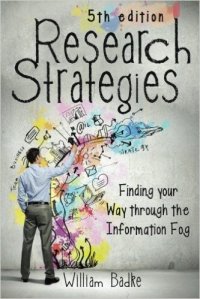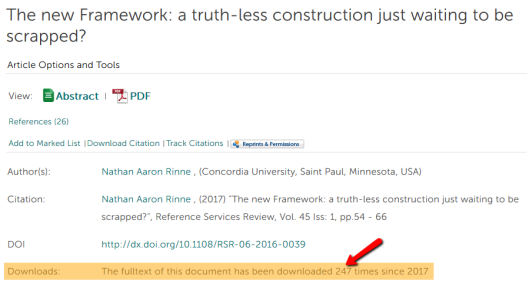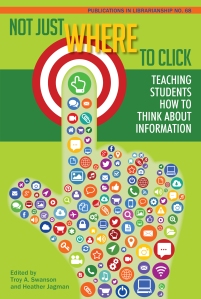In my book, Bill Badke is a superstar librarian. He is the author of the very helpful book Research Strategies: Finding Your Way Through the Information Fog (now in its 5th edition!)

Bill’s book – which you might want to check out!
In one of my papers criticizing the “Authority is Constructed and Contextual” frame in the new ACRL information literacy Framework (see last post), I make the argument that “the Framework… fails to clearly establish the critical connection between truth and authority… this decision is fatal for the Framework.”

Glad to see the paper’s a hit.
Badke, however, very intelligently pushes back:
I think the issue of “truth” creates a distinction between theoretical constructs and the way we live as human beings. We can argue that no data/information exists without a measure of subjectivity, so there is no such thing as objective truth. That’s theory. Practice is that, when I approach a red light, I had better believe that it really is red and that there are rules about what I must do.
My point is that we live in the midst of social conventions, regulations and simply good things to believe and do. These things constitute the lubrication that makes society function. Authority may be constructed and contextual, but our constructions and context still help us find consensus that is not open to a lot of negotiation. We may differ on points, but most of our lives are governed by a sense of truth. When those essentials are disrupted (as they seem to have been a lot recently) we become uneasy, wondering what is happening, trying to figure out where the bedrock is.
That is why I don’t see “Authority is constructed and contextual” as nearly the challenge that some see. For most of what we know, we come to some measure of consensus. Where we disagree, we still have means, through conventional practices of argument and evidence presentation, to make our cases.
What I am much more worried about is the loss or desecration of those conventional practices. Fake news and alternative facts take us into the realm of pure subjectivity, where there is no solid means to construct authority. That is why, when we construct authority within contexts, we had better preserve the methods that best enable us to do so.
My initial response to this was to say, in part, the following:
Insofar as I understand you to be saying that truth has a role in constructing us, I respect your viewpoint very much and find it to be rather compatible with what I’ve written. It contains some real clarity and critical thinking.
Therefore, if the phrase “Authority is Constructed and Contextual” (AiCC) was mentioned as it is here in your “frame,” I think my concerns would not be nearly as great.
However, “AiCC” is in the Framework’s provided frame, and that makes all the difference…
My first paper listed above includes the line: “Given the prestige of the ACRL, it is imperative that the Framework be a product of the best critical thinking. It should not be noted for its concealed propositions, unarticulated assumptions, and disregarded alternatives” (64).
My second paper goes into much more detail which explains why I think Bill underestimates the problem…
Later on, Bill, in a response to another poster on the ili listserv, defended the Framework’s “Authority is Constructed and Contextual” language with the following comment:
…I personally believe in truth. But definitions of it, as you say, are pretty much impossible to agree on. So we have alternatives: a radical Postmodernism that sees everything as subjective and consensus, let alone truth, as impossible; a world in which speculation and paranoia drive “knowledge” and verification is a bad word; and the means we have long used to determine authority. To say “Authority is constructed” does not in any way imply that there is no method to the construction. In fact, the very essence of scholarship is the set of careful methodologies we have developed to help us determine what we should believe. We can find agreement on many things. Our information environment is not one of ever questioning and never finding resolution. Scholarship is a quest with a goal. Method drives that goal or we really are doomed.
I could hope that everyone would define truth in the same way (so that it could actually be truth), but I don’t see that happening. What I hope for, instead, is that we will use our conversations, our methodologies, our authority construction work to find a path to agreement about many things, while continuing to do battle over others. The enemy at the gates today is conjecture and speculation masquerading as authority.
Here is my full response to what Bill has to say here:
I respect Bill Badke more than I can express. I do not disregard his “I personally believe in truth” approach as nothing. I think there is a need for persons to address the matter in both intelligent and very gracious ways – as he has done in spades.
At the same time, I will level with all of you: when it comes to this important issue, I personally am not interested in compromise (surprise, surprise!).
I assert: Truth need not be a focus in information literacy documents, but it should, at the very least, get an intelligent mention (and “AiCC” as a phrase, mentioned as it is without any qualifications – regarding its limitations and otherwise – should die the death is so richly deserves).
I think these are the days when those who name truth and who speak of its importance – who urge its seeking – must prevail. The conviction mounts daily against all agnosticism towards this concept. Something like what the actor Denzel Washington said to reporters about “fake news” should be said to all who endeavor to construct “useful” ideas, solve problems, and make a difference in this world.
Yes, I am well aware of the fact that though the Standards – unlike the Framework – at least provided us with a bulwark with which to combat error, falsehood, lies… “useful fictions” which amount to mere propaganda (“Recognizes… deception, or manipulation”) – even they did not see it necessary to mention truth.
So what?
Yes, I’m under no illusions that there will be much interest in this or that I will persuade many. The days when most every college in this country had some sort of motto like Harvard’s: “Truth (Veritas) for Christ (Christo) and the Church (Ecclesiae),” – and believed it – have come and gone. Way gone.
So what?
Yes, I am not naïve enough to think that when people fought the Wisconsin governor Scott Walker over his desire to excise the words “search for truth” from the charter of U-W Madison that the majority of those who did so actually cared deeply about the matter.
So what?
Yes, I know that we, being the sophisticated folk we are, might, on occasion, appreciate what amounts to rhetorical flair – speaking of things like “inconvenient truths,” and the like – but that overall, as a whole, the academy has no confidence in the idea (it being an either futile – or perhaps even tainted…dangerous? – task).
So what?
As Bill brilliantly (subtly!) pointed out, our practice cannot live with our theory. We *know* better.
And all of us – regardless of whether we are Jew or Gentile, gay or straight, Hegelian or Aristotelian – are, to one degree or another, constantly trying to organize, define, and state what is true. In other words, we are trying to “be[]” – or at least portraying ourselves as trying to be – “in accordance with the actual state or conditions; conforming to reality or fact”.
As human beings we don’t want to be – or at least to come off as – false.
As I put it in a previous comment, to one degree or another, truth constructs us – and again, we simply can’t avoid this regardless of what philosophy or worldview we hold to.* Of course, to speak of “what is the case” like this is not all there is to truth – ethical behavior** comes into play as well – but it is not less than this either.
No, classical figures like Epictetus were right:
“If you seek Truth, you will not seek to gain a victory by every possible means; and when you have found Truth, you need not fear being defeated.” ***
Are right. And so many of the others from that time – the non-Sophists – who spoke gravely, reverently, and joyfully about “the good, the true, and the beautiful” were right. Were being true.
I’ll stick with them.
I became a librarian precisely because I cared about truth and wanted to know it. I’m not interested in the profession otherwise. Curious to know if there are any others who agree with me. If so, I’d love to hear from you. Contact me off list if that’s the case.
And if you think I’m just an out-of-place preacher (my dad is) who just needs to “go home,” contact me as well. I bet we could have a dandy of a conversation (in good time).
But also consider giving me the best possible response you can to my published papers. I’m sure I have a lot to learn. : )
Best regards,
Nathan
+++
I hope people will check out my papers, which contain much more extensive argumentation. Here is what Troy Swanson, one of the editors of the book shown below, had to say about my Reference Services Review paper:
“I am enjoying your work on the Authority frame. When we proposed the Framework, I think we envisioned real scholarly discussions around the 6 frames with the hope that they would grow and evolve.”
(Very) cautiously optimistic.

Be sure to check out Lane Wilkinson’s fine chapter in here. Also hear Swanson interview Wilkinson here.
FIN
Notes:
* From the Christian Librarian paper (the second paper on AiCC) I mentioned in my initial message above: “And this can be seen to go hand in hand with the kinds of things that the motorcycle mechanic philosopher Matthew Crawford says in his most recent book, The World Outside Your Head. He notes, for example, “the world is known to us because we live and act in it, and accumulate experience… we think through the body” (Crawford, 2015, pp. 50-51). In other words, at least certain things “outside our head” subsist “authoritatively,” creating what the literary scholar Hans Gumbrecht has called “presence effects” (2004, p. 108). These, in effect, exercise their own intrinsic meaning as they help structure our attention, thereby anticipating our minds’ interpretive activities. Current trends in Western education, on the other hand, would even seem to suggest that facts are true for individuals only if they can be proved (McBrayer, 2015).” Of course, we also know that if we grow disposed to ignore truth, our neighbor will not let us do so entirely.
.
** As I have argued elsewhere, “In one sense, we are all ideologues (for example, even those who are dogmatic about being undogmatic feel and/or think that there are some forms or ways of being and doing that are better than others! [I now add: and some must actually be discouraged or even actively suppressed!]). But the key question is what kind of ideologue we are… both in our convictions about how we are to treat others and how open we are to considering empirical evidence that might challenge, even radically challenge, our viewpoints and narratives.”
*** At the same time, Augustine puts his finger on another valuable truth about truth: “They love the truth when it enlightens them, they hate it when it accuses them.”
Contact info: Nathan Rinne | Librarian | Concordia University, St. Paul | 651-641-8273 (ph) | rinne@csp.edu
| My librarian blog: https://reliablesourcessite.wordpress.com/ | My librarian Twitter: https://twitter.com/NRinne1
….

Note: Bill responded as follows:
“Nathan makes a number of excellent points, and we are not nearly as far apart as it may appear. My critique of potentially using the word “truth” in the Framework is that truth, in a post-truth society, can so easily be used as an easy path to support a particular ideology. Nathan, in no way, would support that kind of thinking, but there are lots of folks who throw “truth” around as a badge for whatever warped beliefs they are currently embracing. I prefer focusing on the method for our inquiry, on the strength of our conversations (which should never wallow in subjectivity), and the goals of our authority construction. The real battle we wage is against those who would hijack the essence of scholarship – our well-designed, evidence-based methods for seeking what we can believe – in favor of “I read it somewhere, so it’s true.” The real crisis librarians must engage is the growing triumph of anti-intellectual falsehood without evidence masquerading as “truth.”
LikeLike
What might a universal “truth” relate to? And how might we evidence that which we propose it relates to, universally? For instance, the traffic light is “red” to a limited portion of a particular miniscule young species in the universe. As most all the perceptual or cognitive features of the human. I have a sense still that you utilize the language-term “truth” as a concept, rule, or practice that extends beyond particular sets of human beings. Would you consider the “scientific method” a human practice that relates somehow to a presupposed “universal reality” – something the case for all things at all times? How about spiritual practices, logic, play, reason, or art? What evidence do you have that goes beyond conventional practices and pragmatism – elements of organismal activity that you might deem “better” or “more effective” – by what standard? These questions riffle through me when I read your standpoint. It’s hard for me to pin down the myriad qualifications for “truth” from your position, i.e. what “truth” or position in regard to human-experience in surround are you propagating?
LikeLike
Nate,
Thanks for replying. Let me take a stab at some of what you say above.
“Would you consider the “scientific method” a human practice that relates somehow to a presupposed “universal reality” – something the case for all things at all times?”
Not necessarily. I think it is something that is valuable and potentially available to all human community. It may exist in the most rudimentary form among groups (i.e. the stars follow consistent patterns, boats always float, etc.), but of course Aristotle and Bacon take things to new levels. I like Pliny as a good example of the kind of inquiry that might be realized and hence more readily available to a wider range of the human community… I think what Bacon has left us with specifically is something rather perilous as we face the future. Within limits, the scientific method can be used for good. Now, it appears likely to exacerbate the problems of equality more and more.
“I have a sense still that you utilize the language-term “truth” as a concept, rule, or practice that extends beyond particular sets of human beings.”
Yes. Though in my mind truth is first connected with honesty that be expected due to shared sensory experiences, which immediately brings us into the realm of ethics (this is not all it has to do with ethics of course).
“What evidence do you have that goes beyond conventional practices and pragmatism – elements of organismal activity that you might deem “better” or “more effective” – by what standard?”
I like “better” – “effectiveness” can lead us down dark, dystopian, paths. This conversation continues to go on at the ili listserv. Here is my most recent response, which it seems to me also touches upon (not as directly as you might like) the things you ask about above.
Someone asked: “The problem with having the Framework address truth, is that it will add one more definition/concept to its arsenal that we will be forced to sign on to, even if we don’t fully agree with it (or agree with it at all.)”
I replied:
“I would argue that there are things in the cosmos that can be nailed down pretty good and that there are also things which we know are real, but are more “fuzzy”. For example, things like justice, goodness and love, while being known to be real (yes – perhaps many of you now say I am assuming far too much!), often seem hopelessly fuzzy and/or multi-faceted. Nevertheless, we still endeavor to speak about these things in our shared life together – and often – because they are very important.
Re: justice, for example, it is not necessarily the case that no sense of clarity at all can be obtained:
“Moral indignation is evident even among those, who, like robbers, have little active regard for the common good. Gratitude for favors only makes sense because a favor goes beyond what is just, and resentment for injury only because it falls short of justice. All these natural sentiments presuppose the idea of justice. Property rights likewise depend on it.” (arguments and insights from Thomas Reid, per Holmes, Arthur, Fact, Value, and God, p. 117)
And so I argue that the same goes for “truth”. In not seriously considering the importance of even mentioning this very human issue in our discipline, are we thereby, in effect, making the case that the meaning of the word “construct” is more clear? More helpful? Less liable to abuse by the powerful?
+++
Could say more, but I’ll leave things there for you to react to.
-Nathan
LikeLike